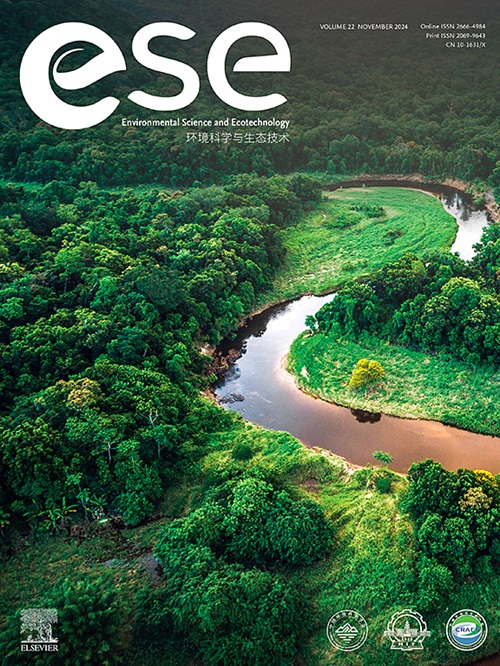Climate change unveils hidden microbial dangers
IF 14.3
1区 环境科学与生态学
Q1 ENVIRONMENTAL SCIENCES
引用次数: 0
Abstract
Climate change is driving unprecedented transformations in aquatic ecosystems, where microorganisms play a fundamental role in maintaining ecological balance and human health security. Rising water temperatures, pollution intensification, and extreme weather events are driving significant shifts in microbial community structures. These changes facilitate the proliferation of pathogenic microorganisms such as Vibrio cholerae and harmful algae like cyanobacteria, which thrive in warmer, nutrient-enriched environments. The resulting harmful algal blooms release potent toxins, such as microcystins, that contaminate drinking water and food supplies, leading to severe health impacts, including liver diseases and carcinogenesis. Furthermore, antibiotic resistance genes are spreading more rapidly due to climate-induced stressors, increasing the prevalence of antimicrobial-resistant pathogens and compounding the challenges for global health systems. This discussion article demonstrates that climate change influences aquatic microbial ecosystems through interconnected mechanisms, including shifts in gene transfer networks, alterations in microbial metabolism, and ecological feedback loops, ultimately increasing waterborne disease risks and antimicrobial resistance. Specific solutions are proposed, such as advancing wastewater treatment technologies to address climate-induced pollution, establishing global microbial monitoring networks leveraging remote sensing and molecular tools, and implementing early warning systems for waterborne disease outbreaks. Additionally, the discussion article emphasizes the critical role of international cooperation in funding and capacity-building efforts, particularly in developing regions with fragile infrastructures. By highlighting these pressing challenges and proposing actionable strategies, this research underscores the urgent need for integrated approaches to safeguard water resources, mitigate microbial hazards, and enhance public health resilience in an era of accelerating climate change.

气候变化揭示了隐藏的微生物危险
气候变化正在推动水生生态系统发生前所未有的变化,微生物在维持生态平衡和人类健康安全方面发挥着根本作用。水温上升、污染加剧和极端天气事件正在推动微生物群落结构的重大变化。这些变化促进了霍乱弧菌等病原微生物和蓝藻等有害藻类的繁殖,它们在温暖、营养丰富的环境中茁壮成长。由此产生的有害藻华释放出强效毒素,如微囊藻毒素,污染饮用水和食物供应,导致严重的健康影响,包括肝病和致癌。此外,由于气候引起的压力源,抗生素耐药基因正在更快地传播,增加了抗微生物药物耐药性病原体的流行,并加剧了全球卫生系统面临的挑战。这篇讨论文章表明,气候变化通过相互关联的机制影响水生微生物生态系统,包括基因转移网络的改变、微生物代谢的改变和生态反馈回路,最终增加了水传播疾病的风险和抗菌素耐药性。提出了具体的解决方案,例如推进废水处理技术以应对气候引起的污染,利用遥感和分子工具建立全球微生物监测网络,以及实施水传播疾病暴发的早期预警系统。此外,讨论文章强调了国际合作在筹资和能力建设方面的关键作用,特别是在基础设施脆弱的发展中区域。通过强调这些紧迫的挑战并提出可行的战略,本研究强调了在加速气候变化的时代,迫切需要采取综合方法来保护水资源,减轻微生物危害,并增强公共卫生抵御能力。
本文章由计算机程序翻译,如有差异,请以英文原文为准。
求助全文
约1分钟内获得全文
求助全文
来源期刊

Environmental Science and Ecotechnology
Multiple-
CiteScore
20.40
自引率
6.30%
发文量
11
审稿时长
18 days
期刊介绍:
Environmental Science & Ecotechnology (ESE) is an international, open-access journal publishing original research in environmental science, engineering, ecotechnology, and related fields. Authors publishing in ESE can immediately, permanently, and freely share their work. They have license options and retain copyright. Published by Elsevier, ESE is co-organized by the Chinese Society for Environmental Sciences, Harbin Institute of Technology, and the Chinese Research Academy of Environmental Sciences, under the supervision of the China Association for Science and Technology.
 求助内容:
求助内容: 应助结果提醒方式:
应助结果提醒方式:


